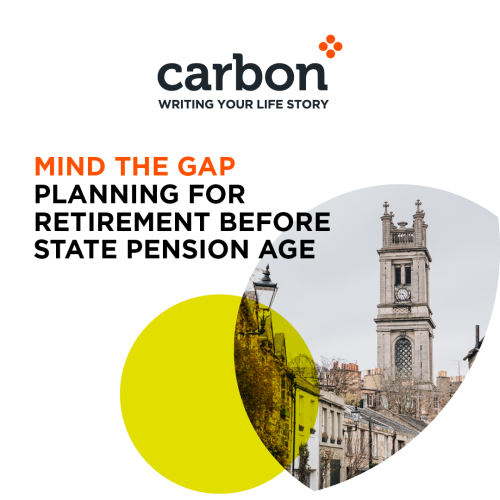News
Mind the gap – Planning for retirement before State Pension Age.

When we meet clients for the first time, they often have an idea of when they want to retire. This tends to be between age 60 and 65 and is typically before they reach state pension age at 67. This creates a gap between leaving employment and receiving State Pension. Most people will need additional funds to top up their state pension to meet their retirement expenditure needs, especially in the early active years of retirement.
There are options available that will allow you to plug the gap, such as:
- Save surplus income during working years.
- Invest in a Stocks and Shares ISA.
- Increase pension contributions to private pensions.
- Take a higher level of investment risk.
Save surplus income during working years.
Building your cash savings using excess income is a great first step and might be the only step required if you are planning to retire within the next 5 years, as investing is for the long-term
Interest rates are the most attractive they have been in over a decade but cash is still a poor investment over any meaningful time period. It has historically failed to provide a long-term return above inflation and so your cash would be worth less in the future after inflation erodes the value.
We encourage all clients to maintain a healthy cash balance throughout retirement. An emergency fund can absorb financial shocks and prevent you from disinvesting during a market crash so building that reserve during your working life is a good plan.
Invest in a Stocks and Shares ISA.
If you are planning to retire in your early 50’s, accessibility of pensions is an issue. The age you can normally access pension savings is 55 but this is rising to 57 imminently. With a Stocks and Shares ISA, you can access your funds at any age and so is a great facilitator of early retirement. Because ISAs and pensions have different tax treatments, it makes sense to have a foot in both camps, as this will give you more flexibility when you start drawing an income.
Increase pension contributions.
Paying into a private pension is the most common way of funding retirement. The government encourage employers and employees to make pension contributions by providing tax relief at basic rate immediately. A great start would be to maximise your employer contribution in your workplace pension, this can be viewed as extra remuneration that you would not receive otherwise. Often, your employer will expect you to make personal contributions from your salary for them to match this contribution.
Pension contributions are especially attractive to higher/additional rate taxpayers who can claim extra tax relief through their tax return.
Typically, 25% of pension benefits that you build up can be taken tax-free and the remaining 75% is taxable. It can sometimes make sense to draw taxable income in the years between retirement and State Pension Age to use up your income tax personal allowance. This is something that we help clients with when we discuss the most efficient income strategy for their circumstances.
Take a higher level of investment risk.
If you have already built up a pot of money in either ISA or pension, another option is to grow your investments and make your money work harder for you. This is usually achieved by increasing your portfolio’s exposure to the stock market. With higher returns comes higher risk and you should invest in line with your own personal risk tolerance. The best portfolio for you is the one you can stick with through good and bad market periods.
A key point to note around your retirement and state pension age is that they do not need to coincide with each other, you can retire much earlier or later and facilitate any shortfall from other assets that your have. We have touched on building a cash reserve, contributing to ISAs or pension, and managing your investment risk but the list can be extended to using other assets to help plug any gaps.
At Carbon, we work with our clients to ensure they have a robust, tailored plan that allows them to spend the money they have accumulated on the things that are important to them and they enjoy.
If you would like to find out more about how we help clients structure their retirement income, please contact Dean McFarlane on 0131 220 0000 or your regular contact at Carbon, we are also available on enquiries@carbonfinancial.co.uk.
The value of investments and the income derived from them can fall as well as rise. You may not get back what you invest.
This communication is for general information only and is not intended to be individual advice. It represents our understanding of law and HM Revenue & Customs practice. You are recommended to seek competent professional advice before taking any action.
Tax and Estate Planning Services are not regulated by the Financial Conduct Authority.

Sign-up for our Carbon Catch-Up Newsletter
Part of The Progeny Group
Progeny is independent financial planning, investment management, tax services, property, HR and legal counsel, all in one place.
Carbon Financial Partners, part of The Progeny Group, is a trading name of Carbon Financial Partners Limited which is authorised and regulated by the Financial Conduct Authority under reference 536900.
Carbon Financial Partners Limited is registered in Scotland. Company registration number SC386400. Registered Address: 61 Manor Place, Edinburgh, EH3 7EG. Carbon Financial Partners Limited is part of The Progeny Group Limited.
© Carbon Financial Partners 2026
www.financial-ombudsman.org.uk
Client Account | Personal Finance Portal | Privacy Notice | Cookies | Careers
